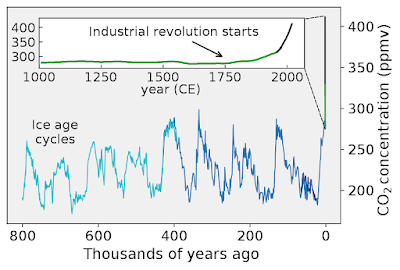Industrialisation has been a key contributor to recent climate change. Industrialization involves the widespread use of fossil fuels such as coal, oil, and gas, which release large amounts of greenhouse gases into the atmosphere when burned. Here are some ways in which industrialisation has led to recent climate change:
Burning of Fossil Fuels
The burning of fossil fuels is the primary driver of climate change. As industries have grown, so has the demand for energy, and fossil fuels have become the primary source of energy for most industries. When fossil fuels are burned, they release carbon dioxide and other greenhouse gases into the atmosphere. The increased concentrations of these gases trap heat, causing the Earth's temperature to rise.
Examples of industries that rely heavily on fossil fuels include transportation, manufacturing, and energy production. For example, the transportation sector, which includes cars, trucks, and airplanes, is a significant contributor to greenhouse gas emissions, accounting for around 24% of global emissions. Similarly, the manufacturing industry is also a significant contributor to greenhouse gas emissions, as it relies heavily on energy-intensive processes that require large amounts of fossil fuels.
Land Use Change
Land use change, particularly deforestation, is a significant contributor to climate change. Trees absorb carbon dioxide through photosynthesis, and when they are cut down, the carbon stored in them is released into the atmosphere. Deforestation is driven by many factors, including industrialization and the expansion of agricultural land.
For example, the expansion of palm oil plantations in Indonesia and Malaysia has led to significant deforestation, resulting in the release of large amounts of carbon dioxide into the atmosphere. Additionally, urbanisation has led to the conversion of natural habitats into cities and suburbs, resulting in increased greenhouse gas emissions from transportation and energy use.
Industrial Processes
Industrial processes, such as cement production and steel manufacturing, are significant contributors to greenhouse gas emissions. Cement production is particularly energy-intensive, and the process of making cement releases large amounts of carbon dioxide. The chemical reactions involved in producing steel also release significant amounts of carbon dioxide.
For example, the cement industry accounts for around 7% of global greenhouse gas emissions. The steel industry is also a significant contributor to greenhouse gas emissions, accounting for around 7% of global emissions.
Transportation
Transportation is a significant contributor to greenhouse gas emissions, and the growth of transportation needs is driven by industrialization. The use of cars and trucks, in particular, relies heavily on fossil fuels, and transportation infrastructure also requires significant amounts of energy.
For example, the transportation sector is responsible for around 24% of global greenhouse gas emissions. The use of cars and trucks, in particular, is a significant contributor to greenhouse gas emissions, accounting for around 17% of global emissions.
Increased Consumption
Industrialisation has led to increased consumption, with people consuming more goods and services than ever before. This increased consumption has led to increased production, resulting in higher greenhouse gas emissions from manufacturing and transportation.
For example, the global production of goods has increased significantly over the past few decades, resulting in increased greenhouse gas emissions from manufacturing and transportation. Additionally, the growth of the service sector, which includes industries such as tourism and finance, has also led to increased consumption and greenhouse gas emissions.
In conclusion, industrialisation has led to significant changes in the way we produce and consume energy, resulting in higher greenhouse gas emissions and contributing to climate change. Addressing these issues will require significant changes to the way we produce and consume energy, as well as changes in land use, transportation, and consumption patterns












No comments:
Post a Comment